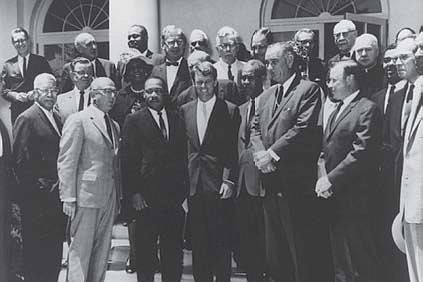MLK: MILITANT OF THE 21ST CENTURY
MLK: MILITANT OF THE 21ST CENTURY
By Lee A. Daniels
Dr. Martin Luther King, Jr. hasn’t been this alive since 1968. He’s no longer that visually distant, two-dimensional figure, limited to speaking a single sentence taken out of context and shorn of its true meaning. Instead, the honest scholarship and media commentary considering what King faced and what he did have broken through the obscuring fog of conservative, and yes, centrist, propaganda.
In part, that’s because, today the confrontation between the forces of progress and the racist reaction to that progress is sharper than any time since the 1960s.
Today, as in the 1960s, American society is grappling with elevating new groups of Americans to full citizenship. Today, as in the 1960s, it’s being forced to confront the meaning of its widespread poverty and joblessness, and its diminished educational opportunity.
Today, as in the 1960s, Black Americans’ right to vote is under siege from conservatives, as are women’s reproductive rights. And today, as in the 1960s, the country is debating the extent of government’s responsibility to protect individuals’ access to opportunity.
Dr. Martin Luther King, Jr.’s words and actions seem relevant again because they’ve always presented a challenge to the status quo and always surged individuals to live up to humanity’s best possibilities.
That command has become particularly compelling again because of the remarkable juxtaposition of present-day developments. Speaking in the early 1990s, when the conservative political ascendancy was at its height, Rev. Hosea Williams, one of King’s lieutenants during the civil rights struggles, explained that “There is a definite effort on the part of America to change Martin Luther King, Jr. from what he was really about – to make him the Uncle Tom of the century. “ Williams insisted, “In my mind, he was the militant of the century.”
Williams was right, and King’s importance – his militancy – is still not completely understood today. He didn’t “make” the Civil Rights Movement. He wasn’t its operational leader or its major tactician. But he was its national and international spokesman – the man who, speaking in that rich baritone, could turn words into emotions that were otherwise inexpressible and into word-pictures that represented the entire tapestry of the centuries long Black freedom struggle.
Dr. Martin Luther King Jr.’s 13-year life on the national stage brilliantly represented the courage it took in those decades to challenge the seemingly overwhelming power of the South’s racist power structure. Far less acknowledged is the courage it took for King – after the passage of the Civil Rights Act of 1964 and the Voting Rights Act of 1965, and his being awarded the 1964 Nobel Peace Prize – to resist the temptations of partial success and his own fame.
Instead, King kept moving leftward, to confront the racial and economic injustice that had created and maintained the Black ghettos of the North, and the national hubris that had led America into the quagmire of war in Southeast Asia.
For this he was pilloried by President Lyndon B. Johnson and much of the White liberal establishment, and a good portion of the civil rights and Black political establishment, too. His insistence that nonviolence was still a viable means of social change was ridiculed, as were his plans to stage a multiracial Poor Peoples March on Washington and involve himself in the bitter sanitation worker’s strike in Memphis, Tenn.
But those difficult years were actually King’s finest hours. At the moment of his assassination, he was standing where he had begun his public life: with ordinary Black people who were being unjustly denied their human rights.
King’s refusal to submit offers a lesson to take to heart at this moment when conservative politicians and theorists are trying to restore inequality of opportunity as the law of the land.
It tells us we should adopt King as The Militant of the 21st Century, too.
Latest Stories
- ISBE and Lurie Children’s Launch Free, Data-Informed Resilience-Supportive Schools Illinois Initiative to Strengthen Student Mental Health and Resilience in All Schools
- Alzheimer’s Association Illinois Chapter Strengthens Commitment to Health Equity Through Diversity and Inclusion Initiatives
- Actress Draws From Life Experiences For Music And Acting Preparation
- Former Journalist’s Fragrance Company Promotes Self Care
- Doctors Provide Information About Resources For Women Experiencing Menopause
Latest Podcast
STARR Community Services International, Inc.

